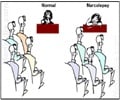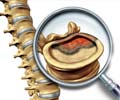Students and patients with psychiatric problems are more vulnerable to develop sleep paralysis, reveals study.

Brian A. Sharpless, clinical assistant professor of psychology and assistant director of the psychological clinic at Penn State, noted that some people who experience these episodes may regularly try to avoid going to sleep because of the unpleasant sensations they experience.
But other people enjoy the sensations they feel during sleep paralysis.
"I realized that there were no real sleep paralysis prevalence rates available that were based on large and diverse samples," Sharpless said.
"So I combined data from my previous study with 34 other studies in order to determine how common it was in different groups."
He looked at a total of 35 published studies from the past 50 years to find lifetime sleep paralysis rates. These studies surveyed a total of 36,533 people.
Advertisement
When looking at specific groups, 28 percent of students reported experiencing sleep paralysis, while nearly 32 percent of psychiatric patients reported experiencing at least one episode.
Advertisement
The study has been published in Sleep Medicine Reviews.
Source-ANI















